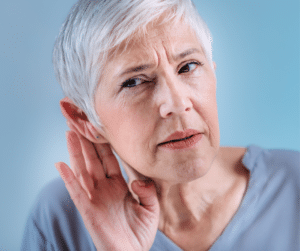Understanding the Conditions Linked to Hearing Loss

- Dementia and Cognitive Decline: Studies have demonstrated a strong correlation between cognitive deterioration, including dementia, and hearing loss. Processing sounds requires more mental effort, which might deplete the brain’s resources for memory and thought. This may eventually cause cognitive ability to decline.
- Social Isolation and Depression: Due to their inability to hear discussions, seniors with hearing loss may isolate themselves from social situations, which can worsen their mental health and lead to depression and feelings of loneliness.
- Balance Issues: Balance and hearing go hand-in-hand since the inner ear is essential for one to remain balanced. However, impaired hearing can have an impact on the vestibular system, leading to problems with balance. As a result, it may raise the chance of falls, which are a serious health danger, particularly for seniors.
- Heart-Related Conditions: Research points to a strong correlation between cardiovascular health and hearing. Hearing loss can result from disorders that alter blood flow to the inner ear, such as heart disease and excessive blood pressure. This means that maintaining good cardiovascular health may help seniors retain their hearing.
- Diabetes: Seniors who have diabetes are more likely to experience hearing loss. Just as diabetes can harm eyesight, high blood sugar can harm the tiny blood vessels of the inner ear. Keeping an eye on and managing blood sugar levels can be crucial for maintaining hearing health.
- Chronic Renal Illness: Seniors who have chronic renal illness are more likely to experience hearing loss. At the cellular level, the kidneys and the ears are comparable organs with similar structures and functions, which means illnesses that affect one can frequently affect the other. Essentially, maintaining healthy kidneys may help avoid hearing loss.
- Sleep Apnea: Hearing loss has been connected to obstructive sleep apnea, a disorder where breathing regularly stops and starts while seniors sleep. The lower oxygen levels that occur during sleep apnea episodes may harm the inner ear’s blood vessels, which means that treating sleep apnea might improve hearing health as well.
Handling Hearing Loss and Associated Illnesses
As mentioned above, it’s critical to understand the connection between hearing loss and other medical disorders. Not only can home care and loved ones help seniors make connections, but they can also encourage them to take steps toward better overall health, including the following:
- Frequent Check-Ups and examinations: Preventative care can aid in the early identification of conditions that may impair hearing. Additionally, hearing exams can help with early intervention, particularly for seniors who are at risk.
- Healthy Lifestyle: Eating a balanced diet, getting regular exercise, and managing chronic illnesses well can all contribute to a healthy lifestyle that supports general health, which includes hearing. Home care can support each of these things, ensuring that seniors have the resources and support they require.
- Assistive Devices and Hearing Aids: Using assistive devices or hearing aids can enhance communication and lessen the effects of hearing loss on day-to-day activities.
Home care and loved ones can support seniors in their quest to improve their general well-being and hearing health by ensuring they’re aware of and take action against the situations associated with hearing loss.
If you or an aging loved one are considering Home Care in Randlman, NC, contact the caring professionals at TenderHearted Home Care today. Call us at (704) 612-4132
- Seniors and Unreported Falls - May 22, 2025
- Six Areas Your Loved One May Need Help With During the Early Stages of Alzheimer’s Disease - May 8, 2025
- What Harms Senior Mental Health? - April 23, 2025

